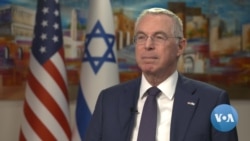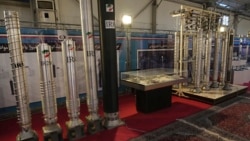Israel’s envoy in the United States has sought to clarify his nation’s red line on Iran’s nuclear program, telling VOA that Israel will prevent its main regional foe from acquiring a capability to become a nuclear-armed state.
Last month in Jerusalem, Israeli Prime Minister Benjamin Netanyahu told visiting U.S. Secretary of State Antony Blinken the policy of his new government, which took office in December, is to “do everything within Israel’s power to prevent Iran from acquiring nuclear weapons and the means to deliver them.”
Blinken said the U.S. agreed that Iran “must never be allowed to acquire a nuclear weapon,” reiterating a long-standing U.S. position.
Netanyahu did not repeat a 2012 warning that he issued during a previous term as prime minister that Iran must be stopped from reaching a threshold short of assembling a nuclear bomb, namely completing 90% of the process for amassing the required amount of highly enriched uranium or fissile material. Tehran insists its nuclear program is only for civilian use.
Israeli Ambassador to the U.S. Michael Herzog addressed the issue of thresholds in the Iranian nuclear program during an interview Tuesday for VOA’s Flashpoint Iran podcast at the Israeli Embassy in Washington.
The following transcript has been edited for brevity and clarity.
VOA: When Israeli Prime Minister Benjamin Netanyahu took office in December, he said Israel is determined to prevent Iran from acquiring nuclear weapons. Just over 10 years ago, he literally drew a red line at Iran getting 90% of the way to having sufficient weapons-grade material to make a nuclear bomb. Why has Netanyahu's position on this issue shifted over time?
Michael Herzog, Israeli ambassador to the U.S.: So, Israel's position and Prime Minister Netanyahu’s position on this issue has not shifted, has not changed. There is a broad consensus in Israel. Mr. Netanyahu and previous prime ministers made it clear that Israel is determined to prevent Iran from acquiring nuclear capabilities or nuclear weapons. But on the way to acquiring weapons, there are all sorts of thresholds that we would like to prevent. And one of them was portrayed by Mr. Netanyahu in the U.N. about a decade ago, where he drew a line of Iran acquiring one bomb's worth of 20% enriched material [which would represent 90% of the process of making bomb-grade material]. And by the way, the Iranians respected that, and did not cross that line until 2021. I think it should be understood by everybody that for Israel, this is a threat of existential dimension, a strategic threat. Israel is determined to prevent Iran from acquiring the capability to become a nuclear-armed state.
VOA: The Biden administration has said it believes Iran is several weeks away from having enough material to make a bomb, and they've said that Iran has been at this level for more than a year. What is Israel's view of the timeline?
Herzog: When we talk about Iran acquiring nuclear weapons, there are two major elements. One is the fissile material itself, the enrichment. And the other one is weaponization. When it comes to the fissile material, as the U.S. administration has indicated, and we agree, the timeline is such that Iran within weeks could acquire one bomb's worth of military grade fissile material. And that is of concern, of course, to everybody. When you talk about weaponization, it's a longer timeline. We have to address both dimensions — we cannot focus just on one and not on the other.
VOA: Why is it that Iran seems to have stayed at this level of being a few weeks away from enough fissile material for so long?
Herzog: Because I think the Iranians realize there are consequences to crossing certain thresholds, if they go to military-grade enrichment. And they are not far away. They are enriching to 60 percent, which is one notch below [weapons grade]. But they realize that if they cross that threshold, then there will be consequences. Certainly, Israel is not going to be indifferent to such a development. And I dare say, also, the United States will probably respond to that.
VOA: Recently the Biden administration has been saying that it is no longer focused on trying to revive the 2015 Iran nuclear deal because of Iran's violent crackdown on protests and Iran's assistance to Russia in attacking Ukraine. The administration also is continuing to honor some parts of that 2015 deal. Earlier this month, The Washington Free Beacon reported that the U.S. has extended some sanctions waivers that allow Iran and Russia to cooperate on civilian nuclear projects. The U.S. also revoked a waiver for another project that Iran and Russia are involved in. What is Israel's view of this U.S. policy?
Herzog: So, first, I think it's clear to everyone that the nuclear deal is off the agenda for now. I'm not suggesting that it is dead. But it is clear that this is not the environment to now sit down with Iran, secure a deal, release hundreds of billions of dollars to the Iranian regime. Neither the United States nor its European allies are going down that road for now.
And to the specific question you asked, there are elements which were agreed upon in the past, whereby some external actors, not only Russia, but also some Western European actors, were allowed to make sure the configuration of some of the Iranian facilities will be only for civilian purposes and not military ones, and that's totally understandable.
VOA: With the U.S. saying that the JCPOA talks are off the table, what is the Plan B for the United States and Israel to prevent Iran from getting even closer to a nuclear weapon capability?
Herzog: We are looking at a holistic strategy, which encompasses all dimensions of Iranian activities, including in the nuclear field, in the regional field, the cooperation between Iran and Russia, and the internal situation in Iran, which has to be factored into any strategic thinking about this situation. I think a critical element is to enhance deterrence vis-a-vis Iran, so that Iranians understand that there are consequences if they move ahead with their program, or to that extent, with their regional activities. They are a major destabilizing factor in the Middle East.
And here, I would like to emphasize that we are very much focused on the internal situation in Iran. We cannot stay indifferent. We see the regime butchering its own people. We see people demanding those liberties. And we believe that what's happening in Iran is essentially the regime losing its own population. I think the gap is huge, unbridgeable. And to the extent that any of us from the outside can express our sympathy and support for the brave Iranian people, we need to do it. And I take this opportunity, in this interview, to do it myself.
VOA: In recent days and weeks, the number and size of street protests in Iran has gone down. What is Israel's message to Iranian people who still want a regime change but are maybe afraid right now to go out on the streets and potentially put their lives at risk?
Herzog: Israel and some of our allies are looking for concrete ways in which we can express that support for the Iranian people by communicating with them and allowing them to communicate with one another.
VOA: Could you give some examples?
Herzog: I do not want to go into details. This is one of the cases where it's better to remain below the radar, rather than talk about it publicly. But, we are looking for ways, us and our allies, to communicate with the Iranian people and help them.






